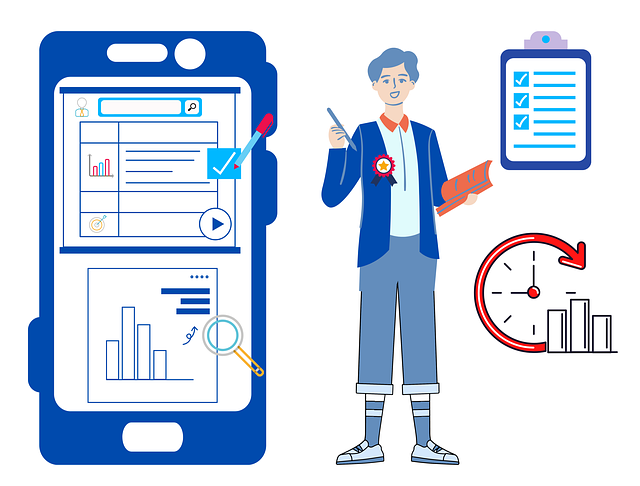Integrating AI into vehicle repair transforms workshops, enhancing diagnostic accuracy and speed, and reducing downtime. AI chatbots provide instant customer support, while advanced analytics predict maintenance needs, improving satisfaction. However, challenges include staff training, data privacy, and recognizing that skilled humans remain vital for complex repairs. Effective AI-powered marketing requires team training in AI tools, data interpretation, and client communication, fostering a culture of continuous learning and adaptability to stay competitive.
“Revolutionize your vehicle repair business with AI! This comprehensive guide explores the transformative potential of Artificial Intelligence in the automotive sector. We delve into the benefits and challenges of AI integration, offering a strategic approach for repair centers to thrive in today’s digital landscape. From understanding advanced technologies to developing tailored AI-powered marketing strategies, this article equips teams with essential tools. Learn how to adopt AI successfully, enhance efficiency, and stay ahead in the market by leveraging cutting-edge techniques.”
- Understanding AI Integration in Vehicle Repair: Benefits and Challenges
- Developing Effective AI-Powered Marketing Strategies for Repair Centers
- Training Vehicle Repair Teams: Adopting AI Technologies and Ensuring Success
Understanding AI Integration in Vehicle Repair: Benefits and Challenges

Integrating AI into vehicle repair processes offers significant advantages, transforming traditional workshops into modern, efficient hubs. By employing AI-powered marketing strategies for vehicle repair centers, teams can enhance diagnostic accuracy and speed, leading to reduced downtime for vehicles. These systems analyze vast data sets to identify patterns, enabling technicians to make informed decisions quickly.
However, challenges exist in this transition. Training staff to use AI effectively requires investment in education and adaptation. Data privacy and security concerns must be addressed to protect sensitive vehicle information. Moreover, while AI streamlines processes, it doesn’t replace human expertise; skilled technicians remain essential for complex repairs. Balancing automation with human labor ensures optimal vehicle care and satisfies customers seeking cutting-edge services.
Developing Effective AI-Powered Marketing Strategies for Repair Centers

With the rise of artificial intelligence (AI), vehicle repair centers have a new opportunity to enhance their services and engage customers through innovative AI-powered marketing strategies. By integrating AI into their marketing efforts, repair teams can streamline processes, improve accuracy, and offer personalized experiences. For instance, AI chatbots can provide instant customer support, answering basic queries and offering preliminary advice, thereby saving time for both staff and clients.
Additionally, AI analytics can help repair centers understand customer behavior patterns, allowing them to tailor their marketing campaigns effectively. This includes predictive maintenance promotions, where customers are notified of potential issues with their vehicles based on AI-analyzed service histories. Such strategic initiatives not only boost customer satisfaction but also foster long-term relationships, positioning the repair center as a forward-thinking, tech-savvy business.
Training Vehicle Repair Teams: Adopting AI Technologies and Ensuring Success

Training Vehicle Repair Teams: Embracing AI Technologies for Success
In today’s digital era, adopting AI-powered marketing strategies for vehicle repair centers is no longer an option but a necessity. Artificial Intelligence (AI) offers unprecedented opportunities to revolutionize how automotive service teams operate and interact with customers. By integrating AI into their training programs, repair shops can enhance efficiency, accuracy, and customer satisfaction. AI technologies, such as predictive analytics and computer vision, enable technicians to diagnose issues faster, recommend personalized solutions, and streamline maintenance processes.
To ensure the success of AI implementation, vehicle repair teams must undergo comprehensive training that covers both technical skills and soft competencies. The focus should be on understanding how AI tools work, interpreting data insights, and effectively communicating complex information to clients. Moreover, fostering a culture of continuous learning and adaptability is crucial. Regular updates, workshops, and mentorship programs can help keep technicians up-to-date with the latest advancements in AI technologies, ensuring they remain competitive and deliver exceptional service.
AI integration in vehicle repair teams offers immense potential, from streamlining processes to enhancing efficiency. However, successful adoption requires addressing challenges like initial resistance to change and ensuring proper training. By developing tailored AI-powered marketing strategies, repair centers can leverage these technologies to better serve customers, ultimately gaining a competitive edge in the market. Effective training, focusing on both technical skills and soft competencies, is crucial for teams to embrace and maximize the benefits of AI in their daily operations.
